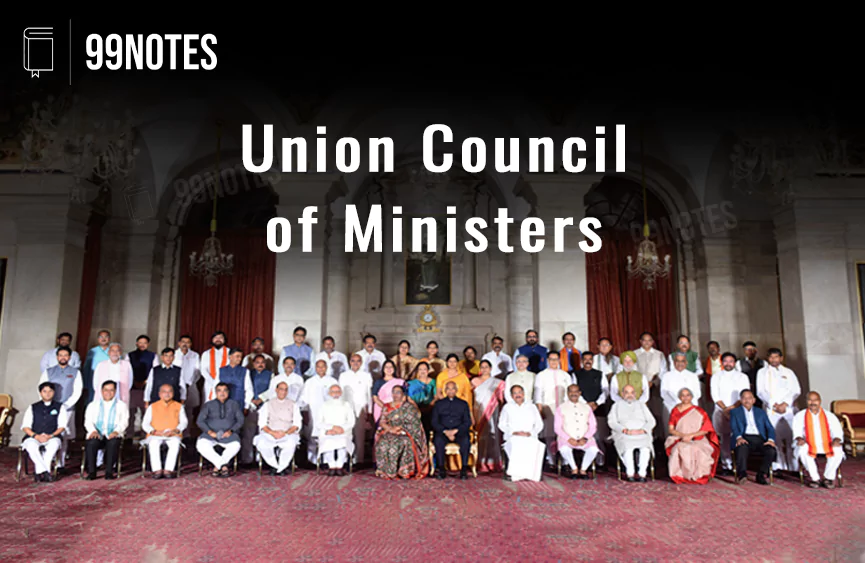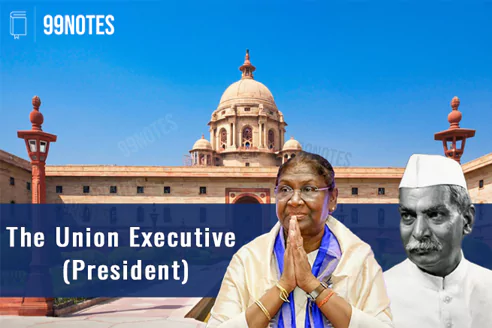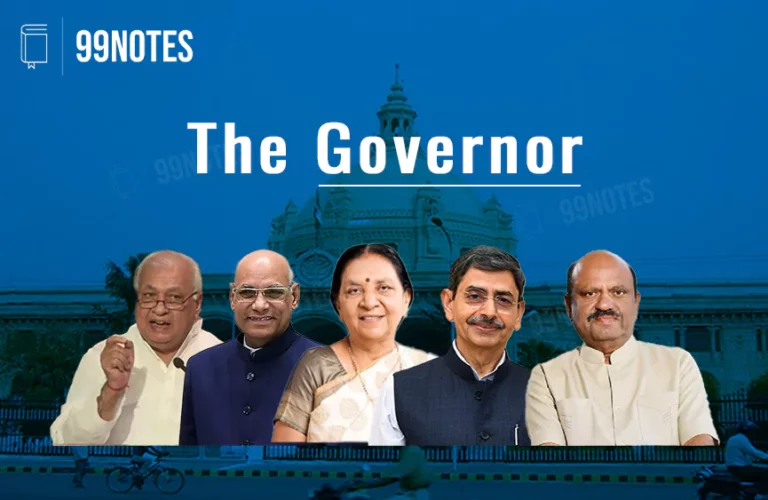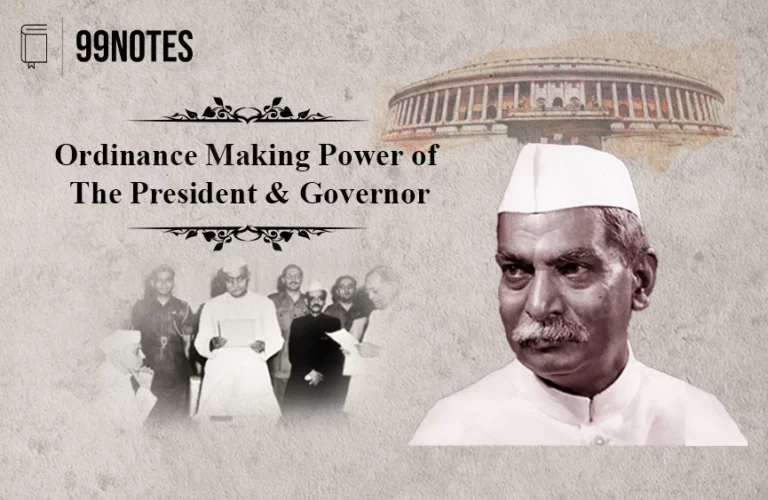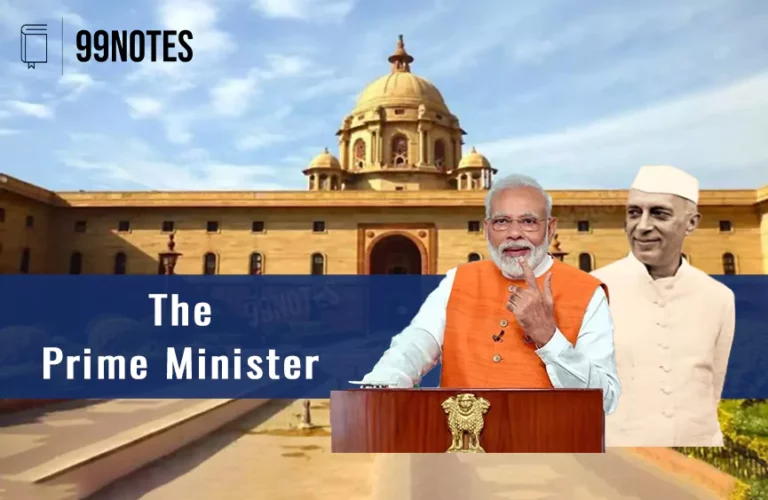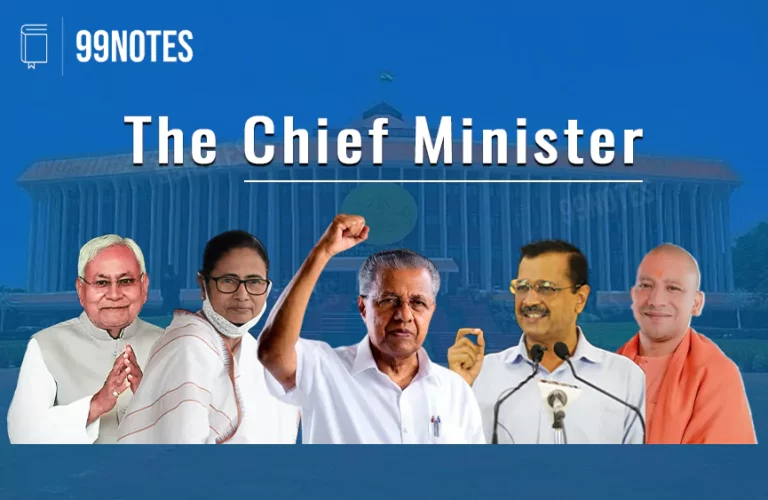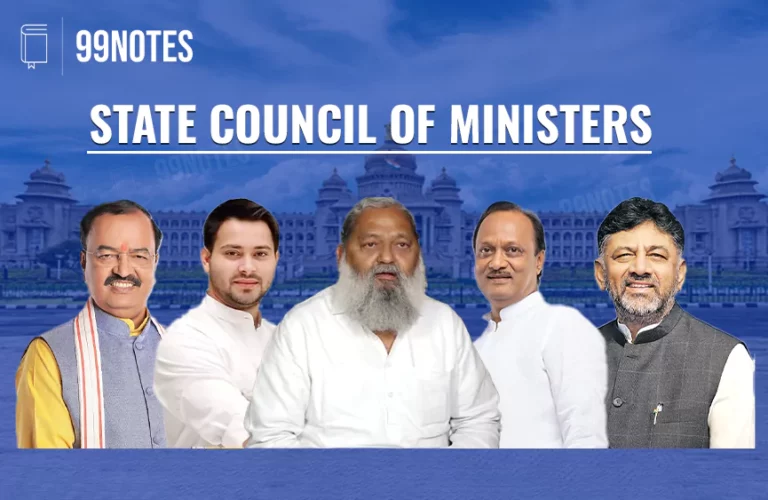Union Council of Ministers and the Cabinet – Indian Polity Notes for UPSC
Union Council of Ministers
In a Parliamentary System, the Council of Ministers (CoM) headed by the Prime Minister wields the real executive authority.
Articles 74 and 75 of the Constitution deal with the power and function of the Council of Ministers.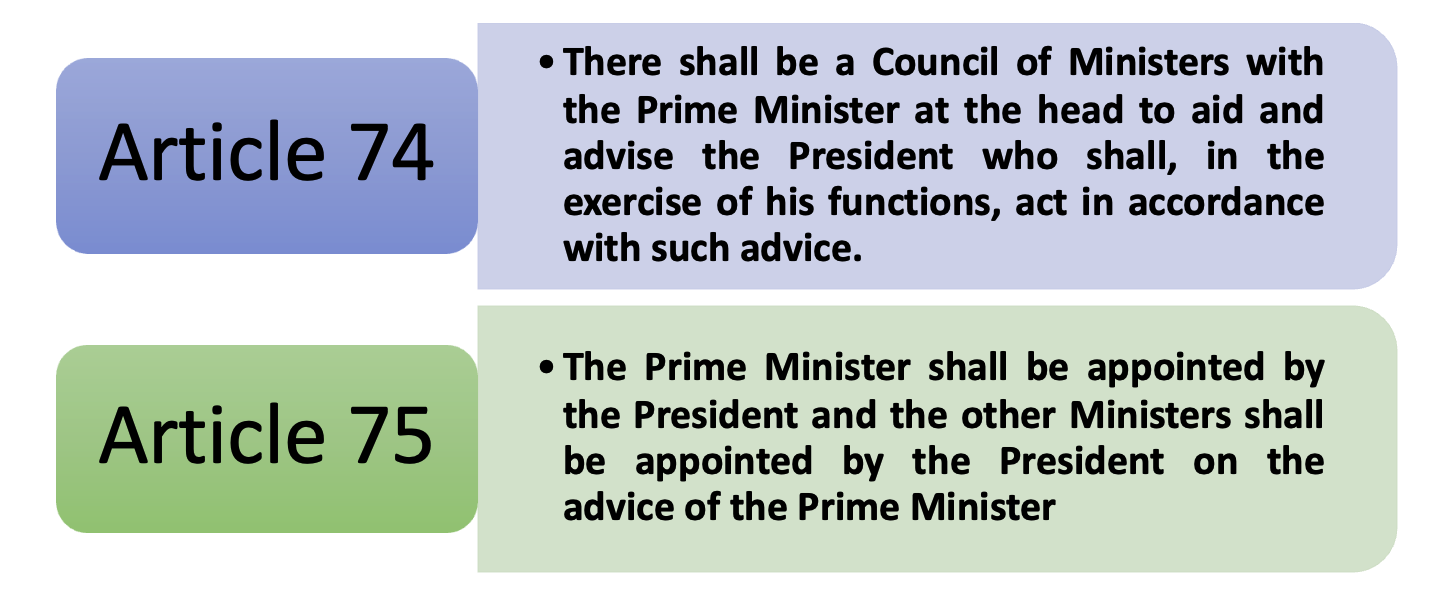
Amendments in Article 74 |
| 42nd Constitutional Amendment: “There shall be a Council of Ministers with the PM as the head to aid and advise the President who shall, in the exercise of his functions, act in accordance with such advice”. (The bold texts were added through the amendment).
44th Constitutional Amendment: It added the following para in the above provision: “Provided that the President may require the Council of Ministers (CoM) to reconsider such advice, either generally or otherwise, and the President shall act in accordance with the advice tendered after such reconsideration”. |
Appointment of the Minister of Union Council
- The PM is appointed by the President, and his/her recommendation other ministers of the Council are appointed by the President.
- A Member of Parliament from either house, both elected and nominated, is eligible to become a minister.
- Even a person who is not an MP can be appointed as a minister, but s/he must become a member of the house within six months of his/her appointment [Article 75].
- A minister has the right to speak and participate in the proceedings of either of the houses of Parliament, but s/he can only vote in the house s/he is a member of.
Oath, Term and Remunerations of the Ministers
Ministers are required to take an oath of office and secrecy before entering office. The third schedule of the Constitution mentions the oath and affirmation of a Union Minister.
Case Study: The Position of Deputy Prime Minister |
|
Term of a Minister of Union Council
- Article 75 of the Constitution states that a minister holds the office at the pleasure of the President.
- It means that the President can remove a minister even when the Council of Ministers enjoys the confidence of the Lok Sabha. However, the President can only act on the advice of the PM in this regard.
- In case of dissatisfaction with the performance of the minister or difference of opinion, the Prime Minister can ask him/her to resign or can ask the President to dismiss him/her. This provision is in line with the Principle of collective responsibility.
Remunerations of a Minister
The Parliament determines the remuneration of a minister from time to time. A minister gets the salary paid to a Member of Parliament; in addition, s/he is entitled to a sumptuary allowance (as per rank), free accommodation, medical facilities, travel allowances, etc.
Principle of Collective Responsibility
The Principle of collective responsibility refers to individual members of the government being held accountable for the actions and decisions of a government as a whole. It is a fundamental principle in the working of a parliamentary system. Under Article 75 of the Government, the Council of Ministers is collectively responsible to the Lok Sabha.
- As per this Principle, it is the duty of every member of the Council to stand by the decisions of the Council of Ministers (Cabinet), both inside and outside of the Parliament. It ensures the smooth functioning of a parliamentary democratic set-up.
- When the Lower House passes a no-confidence motion, all members of the Council are required to resign, including those who are members of the Rajya Sabha.
- The prime minister’s power to appoint ministers (recommend) as well as dismiss them is in line with the Principle of collective responsibility. As per Dr BR Ambedkar, “collective responsibility can be achieved only through the instrumentality of the Prime Minister”.
- The real test of the Principle happens when there is a coalition government where ministers belong to different political parties. It must be noted that this Principle is based on a convention developed in the Parliamentary system of government and does not have a legal or constitutional sanction.
- There are several instances when ministers have chosen to resign in case of disagreement with the Council of Ministers (Cabinet). Dr BR Ambedkar resigned due to his differences on the Hindu Code Bill, CD Deshmukh resigned due to his disagreements on the reorganisation of states, and Arif Mohammed Khan resigned on the issue of Muslim Women (Protection of Rights on Divorce) Act, 1986.
Individual Responsibility of a Minister of Union Council
Besides collective responsibility, the ministers also have individual responsibility to the Parliament. They are answerable for the conduct of affairs of their department in Parliament.
Legal responsibility of a Minister
Unlike Britain, where the concerned minister countersigns every public act and, hence, is legally responsible for his acts in a court of law, the Constitution of India does not have such a provision.
In India, a minister is not required to countersign an order of the President for a public act. Moreover, no court can enquire into the nature of advice tendered to the President by the minister.
Relationship between the Council of Ministers and the President
- Exercises real executive power: The executive power vested in the President by Article 53 of the Constitution is, in reality, exercised by the Council of Ministers.
- Aids and advises the President: As per Article 74, there shall be a Council of Ministers with the Prime Minister at the head to aid and advise the President, who shall, in the exercise of his functions, act in accordance with such advice.
- Conduct of Business: Article 77 provides for the conduct of the business of the Government of India. The President shall make rules for the more convenient transaction of the business of the government and for the allocation among the ministers.
- Duties of the Prime Minister as the head of the Council of Ministers towards the President (Article 78):
-
- To convey to the President all decisions of the Council of Ministers pertaining to the administration of the union affairs and legislative proposals.
- To provide such information relating to the administration of Union affairs and legislative proposals that the President may call for;
- If the President so requires to submit for the consideration of the Council of Ministers any matter on which a minister has made a decision but which has not been considered by the Council.
Composition of the Council of Ministers
The Prime Minister heads the Council of Ministers and comprises ministers who are members of the Cabinet, Minister for State, Minister of State (independent charge) and Deputy Ministers.
The political position, emoluments and role in decision-making differ as per the rank of the ministers.
91st Constitutional Amendment Act, 2003 |
| This amendment added the following provisions in Article 75:
I. The total number of ministers in the Council of Ministers, including the PM, should not exceed 15 per cent of the total membership of the lower house. II. A member of either house of Parliament disqualified on the grounds of defection will also be disqualified from being appointed as a minister. |
Cabinet Ministers
- They occupy the key ministries of the Government like Home, Defence, Finance, External Affairs, etc.
- Being members of the cabinet (highest decision-making body), they play an important role in the formulation of government policies.
- Their roles and responsibilities go beyond their respective ministries; they are members of various cabinet committees.
Ministers of State
- They usually function under the supervision of a cabinet minister; they are allotted specific duties in a ministry headed by a cabinet minister or in charge of a particular department under that Ministry.
- They can also be given a charge of independent Ministry, in which they perform functions similar to a cabinet minister; however, they do not participate in the cabinet meetings unless specifically invited.
Deputy Ministers
- They perform under the supervision of the cabinet minister or minister of state.
- They are attached to the offices of cabinet ministers and Ministers of state and assist them.
- They are not given independent charge of any ministry and do not attend cabinet meetings.
Parliamentary Secretaries
- This is the last category of ministers in the Council of Ministers; however, it must be noted that this category no longer exists. The last time they were appointed was during the Rajiv Gandhi government.
- They are attached to the ministries to assist the cabinet ministers and ministers of state.
- They do not attend the cabinet meetings.
The Cabinet
In a Parliamentary system, the term ‘cabinet’ and ‘council of ministers’ is used interchangeably. However, their position, power and composition vary significantly.
The original Constitution did not mention the term ‘cabinet’. It was added by the 44th Constitutional Amendment Act in 1978, in Article 352. It was added in the context of the proclamation of the National Emergency by the President. However, it does not define the term ‘cabinet’, and it is based on Parliamentary convention.
Position, Power and Function of Cabinet
- It is the supreme executive authority of the union government, responsible for aiding and advising the President;
- It is the highest decision-making body of the union government; plays the most important role in the formulation of government policies, both internal and external;
- It takes all important decisions regarding the defence and security of the country;
- It plays an important role in the financial and legislative matters of the union government:
-
- Expenditure of the union government;
- Raising revenues for the union government;
- Recommending the President to summon and prorogue parliament session;
- In promulgation of ordinances when the Parliament is not in session;
- Setting the agenda of the Parliament session.
Cabinet Secretariat
The cabinet secretariat is responsible for the administration of the government. It is headed by the Cabinet Secretary.
Functions of Cabinet Secretariat
- The Secretariat functions under the provisions of the Government of India (Transaction of Business) Rules, 1961 and the Government of India (Allocation of Business) Rules, 1961.
- It provides secretarial assistance to the cabinet and the cabinet committees.
- The Secretariat assists in decision-making by ensuring Inter-Ministerial and inter-departmental coordination, resolving differences amongst ministries and departments and forging consensus through the deliberations in standing and Committees of Secretaries.
- It plays an important role in the management of emergency situations in the country.
Cabinet Secretary Powers
Cabinet Secretary heads the Cabinet Secretariat and undertakes the following functions:
- Ex-officio chairman of the civil services board: s/he handles all the senior appointments (except under the Ministry of External Affairs) in the government.
- Prepares agenda for cabinet meeting: S/he is present in the meetings of the cabinet and its committees, prepares the agenda of the meeting and is also responsible for the prioritisation and allocation of subjects in such meetings.
- Prepares the minutes of the cabinet meetings, and the same is communicated to various ministries.
- Keeps track of various social, political and economic situations and bottlenecks in the implementation of government programmes and inform the Prime Minister about them.
- Brings continuity and stability to the administration.
Kitchen Cabinet |
|
The Council of Ministers Vs the Cabinet
| Council of Ministers (CoM) | Cabinet |
| The CoM comprises all categories of ministers. | Only Cabinet ministers (senior ministers). |
| The CoM as a whole rarely meets. | The cabinet meets regularly. |
| In theory, the Constitution vests all powers of the union executive in the CoM. | The cabinet wields the real authority. |
| Its functions are determined by the cabinet. | The cabinet takes all decisions on behalf of the CoM. |
| It is a Constitutional body with all its powers and functions defined. | It was added later (1978) in the Constitution, and its powers and functions are not defined. |
| It is collectively responsible to the Lok Sabha. | It enforces the collective responsibility of the CoM in the Lok Sabha. |
Cabinet Committees
The Cabinet committees are extra-constitutional bodies established under the Rules of Business. These committees are instrumental in expediting the decision-making process in specific areas of political, economic and strategic importance.
Types of Cabinet Committees
- Standing: These committees are permanent in nature.
- Ad hoc: These are of a temporary nature and are constituted to deal with unique problems.
Features and functions of Cabinet Committees
- The Prime Minister sets up these committees as per requirement, and hence, their nomenclature and composition vary from time to time.
- Usually, these committees are headed by the Prime Minister, but a senior cabinet minister can also head the committee if the Prime Minister is not part of it.
- These committees usually comprise senior cabinet ministers, but ministers of state can also become part of them.
- The cabinet ministers who are not connected directly with the agenda of the committee are also part of these committees.
- They do not meet regularly; they only meet when a specific subject requires urgent attention.
- They not only solve issues but also formulate proposals for deliberations in cabinet meetings.
- These ministries provide a flexible platform for deliberation of specific issues and lessen the burden of ministries (Cabinet). They are based on the Principle of effective delegation (assigning the right job to the right team).
Cabinet Committees at present
At present, there are 8 cabinet committees functional. All committees, except the Committee on Accommodation (Home Minister) and Committee on Parliamentary Affairs (Defence Minister), are headed by the Prime Minister.
- Appointment committee of the cabinet;
- Cabinet Committee on Accommodation;
- Cabinet Committee on Economic Affairs;
- Cabinet Committee on Parliamentary Affairs;
- Cabinet Committee on Political Affairs;
- Cabinet Committee on Security;
- Cabinet Committee on Investment and Growth;
- Cabinet Committee on Employment and Skill Development.
Position of Union Council of Ministers
- From the above description, it is evident that the Union Council of Ministers wields real authority in the whole political set-up of the country.
- Within the Council of Ministers, it is the cabinet that steers the ship of the government.
- It supervises and controls the formulation of policies and the running of administration.
- The power and position enjoyed by the Council of Ministers (Cabinet) make it the most powerful institution in the Indian political system.
FAQ Section
Who are called Council of Ministers?
The union council of ministers consists of Ministers who assist the Prime Minister of India in governing and managing various government Portfolios. Example: Minister of Finance, Defense, Home affairs, Health, Education, Railway and other.
The Union Council of Ministers is collectively responsible to
The Union Council of Ministers is Collectively responsible to the Lok Sabha, the lower house of Parliament.
Who is the head of the Union Council of Ministers?
The Prime Minister of India is the Head of the Union Council of Ministers.
Maximum Limit of Union Ministers in India?
According to the Article 75(1) of Indian Constitution, the total number of Union Ministers, including Prime Minister, in the council of Ministers shall not exceed 15% of the total number of members in the Lok Sabha, which is 81 out of 545 seats in Lok Sabha.
Other Related Links:
| President of India | Vice President |
| Prime Minister | The Governor |
| Chief Minister | State Council of Ministers |

